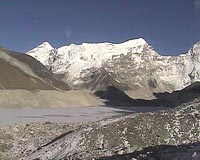| . |  |
. |
Kathmandu (AFP) Aug 31, 2009 Nepal's prime minister opened the first climate change conference of Himalayan nations on Monday with a warning about the dangers of melting glaciers, floods and violent storms for the region. With 1.3 billion people dependent on the water that flows down from the melting Himalayan glaciers, Prime Minister Madhav Kumar Nepal said cross-border cooperation was essential in tackling the impact of climate change. "The threats and risks of climate change have manifested themselves in the melting of the Himalayan glaciers, rising sea levels and violent storm surges," he said as he opened the talks in Kathmandu. "More frequent extreme weather events have affected agricultural production across the region. "The potentially catastrophic impact on lives and livelihoods has assumed a huge importance in our international relations." South Asian environment officials have gathered in Kathmandu for the conference, aimed at highlighting the problems facing the region ahead of a key climate change summit in Copenhagen in December. Environmental campaigners refer to the Himalayas as the "third pole" and say the melting glaciers are the biggest potential contributors to rising sea levels after the north and south poles. But this is the first time Himalayan governments have come together to lobby for ambitious emission reduction targets at the Copenhagen summit, which aims to seal a new international climate change accord. Nepalese lawmaker Lucky Sherpa told the conference mountain communities in the Himalayan nation were already feeling the effects of climate change, with cattle and sheep herders having to seek grazing at higher altitudes. "Climate change poses the highest threat to those indigenous people who have contributed the least to carbon emissions," she said, calling for greater assistance for affected mountain communities. Glaciers in the Himalayas, a 2,400-kilometre (1,500-mile) range that sweeps through Pakistan, India, China, Nepal and Bhutan, provide headwaters for Asia's nine largest rivers, a lifeline for people who live downstream. Andreas Schild, director general of the Himalayan research institute the International Centre for Integrated Mountain Development (ICIMOD), said the melting glaciers could no longer be seen as a local issue. "Copenhagen is a unique chance to put the Himalayan-Hindu Kush region on the international agenda," he said. The two-day meeting of South Asian nations ends Tuesday with a closing statement to be entitled "A Vision on the Way Forward to Copenhagen." However, few nations have sent ministers to the talks, which will likely affect the impact of any statement that emerges. Regional power India is represented by environment secretary Vijai Sharma, a civil servant. Mohan Munasinghe, vice chairman of the Intergovernment Panel on Climate Change, said South Asian governments must begin working together to tackle flooding and water management problems. "The Himalayas are the source of the world's seven largest rivers and supply water to 40 percent of its population," he told delegates. "We cannot afford to fail." Share This Article With Planet Earth
Related Links Beyond the Ice Age
 Melting glaciers threaten 'Nepal tsunami'
Melting glaciers threaten 'Nepal tsunami'Lukla, Nepal (AFP) Aug 30, 2009 Over two decades, Funuru Sherpa has watched the lake above his native village of Dengboche in Nepal's Himalayas grow, as the glacier that feeds it melts. The 29-year-old, who runs a busy Internet cafe for tourists visiting the Everest region, remembers his grandfather telling him that 50 years ago the lake did not exist. "Before, it was all ice," he told AFP in the eastern Himalayan town ... read more |
|
| The content herein, unless otherwise known to be public domain, are Copyright 1995-2009 - SpaceDaily. AFP and UPI Wire Stories are copyright Agence France-Presse and United Press International. ESA Portal Reports are copyright European Space Agency. All NASA sourced material is public domain. Additional copyrights may apply in whole or part to other bona fide parties. Advertising does not imply endorsement,agreement or approval of any opinions, statements or information provided by SpaceDaily on any Web page published or hosted by SpaceDaily. Privacy Statement |